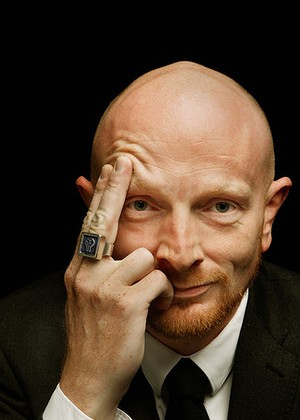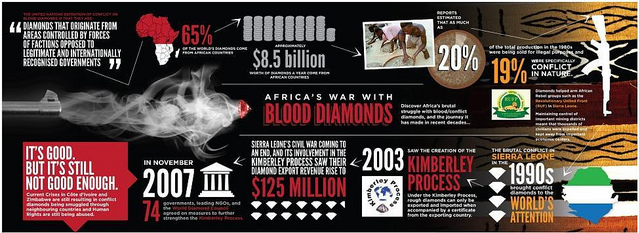
Date: 2024-12-21 Page is: DBtxt003.php txt00003541
Region ... Africa
Corruption and Diamonds
The Stream - Guerrilla diplomat ... talking about a film made about corruption in Africa and the complex web around Blood Diamonds in CAR
Burgess COMMENTARY
I wrote the following on the AJE webpage after watching the Stream program
I was not able to participate in this episode of The Stream, but watched the program later.I have done work in Africa since the 1970s both for a corporate employer and as a consultant for the United Nations, IFAD, IFC and World Bank. This gave me ample opportunity to get some understanding of the immense web of corruption and greed that leads to violence and exploitation on a grand scale.I know something of the countries talked about in the program, and the subject of corruption in Africa and the issues surrounding 'blood diamonds'.
I am grateful to the filmmaker Mads Brügger, Director of the film 'The Ambassador' because he has done something to show the systemic nature of corruption in the modern global economy, something that modern journalists effectively ignore.
When I was growing up, I learned that the media ... journalism, if you will ... was an essential part of the checks and balances of society. However, as an adult I learned that journalism was not about the public service but about 'story' and 'scoop' and not much about getting into the deep reporting of how society is working. After 50 years of superficial journalism corruption and exploitation are rampant, and few parts of our modern global economic system are free of it. I consider the international banks to be a serious piece of the global network of corruption enablers, and rarely in the cross-hairs of investigative journalism even though the illicit profits are huge.
Thank you for this documentary.
In the late 1990s I was working independently to see how the great natural resource wealth of Africa could be used better to benefit ordinary people in Africa when I myself got caught up in the web of corruption and scams of business and politics in Africa.
At the time Charles Taylor was the President of Liberia, and using the mineral resource wealth of the country ... diamonds and gold ... to make himself wealthy and to fund the purchase of arms for the army that supported him, and his agenda for neighboring Sierra Leone. He destroyed his country and was eventually pushed from power. Subsequently he was arrested and years later convicted of crimes against humanity at the International Criminal Court. My visit to Liberia to learn more about the potential to use the country's natural resources as the 'backing' for a 'National Development Fund' that would benefit the people of Liberia turned into a 'face off' between a lone expatriate visitor and members of Taylor's army ... not a match up with good odds, and I ran, making my way to the airport late at night, and not getting caught.
Soon after this scare, I was in Ghana, following up on how the gold of Ghana might be used more effectively to back development in Ghana when I was arrested an put in prison. I am not sure what specific event or connection got the attention of the authorities ... but someone certainly set off this chain of events, and almost certainly it was someone in the 'respectable' business community who also was connected with the gold underworld of scams, corruption and exploitation. My multiple visits to different countries in Africa could also have raised suspicion, especially at the time, my recent travels to Liberia, Cote d'Ivoire and Sierra Leone. After about 10 days I was released ... no explanation ... but I still have lots of questions.
Journalism in Africa is dangerous ... there are many powerful people who do not want journalists to do their job, and violence against journalists and their families is ever present. Local journalists are at high risk and are unable to report what they probably know safely. Most foreign journalists do not have the time to 'dig deep' and they only get a bit of the story and the reporting is superficial at best ... more of travel than news about the society and the economy. The reason I liked this film is that it showed some of the reality ... a disgusting reality that exists not only in the Central African Republic, but in many other parts of Africa and the world.
I have to add that international banks have a huge role in enabling the economic underworld and keep it secret, along with other matters like tax evasion. These organizations could help combat crime ... scams, corruption and exploitation ... but they would be a lot less profitable. In a world where money profit is the primary measure of performance, they will continue their bad practices 'ad infinitum'.
Peter Burgess
The Stream - Guerrilla diplomat
Posing as 'The Ambassador' Mads Brügger exposes the corruption surrounding African diamond trade.
Guerrilla diplomat
'The Ambassador' goes undercover in Central African Republic's game of corruption to expose its players.
With hidden cameras and a black-market diplomatic passport, one filmmaker took on corruption in African diamond trade. Danish journalist Mads Brügger says his controversial documentary 'The Ambassador' shows the harsh reality missed by conventional journalists covering this deadly trade. But does he go too far?
In this episode of The Stream, we speak to: Mads Brügger, Director, 'The Ambassador'
theambassador.dk
What do you think? Do journalists have the right to cross moral & ethical lines to uncover a story? Leave your thoughts in the comments below.
The Ambassador' is a documentary that follows Danish journalist Mads Brügger in the Central African Republic (CAR) as he navigates the corruption surrounding the diamond trade in Sub-Saharan Africa. Brügger poses as businessman who purchases real diplomatic credentials, which he uses to try to smuggle diamonds out of the CAR. Below is a trailer for the film:
Ambassador Official Trailer #1 (2012) - Documentary HD
'The Ambassador' also showcases how easy it is for Western businessmen to acquire diplomatic status from nations seeking to further their business interests.
Questions remain over Brügger's tactics and the roles he plays in his films. Is he a journalist or businessman? Unbiased observer or part of the story? The following post from the African Arguments blog examines this angle:
the line between Brügger the documentarian and Brugger Cortzen the capitalist isn’t clear. As the businessman, Brügger uses his privilege to trample over less important people in order to attain more power. As a filmmaker he does essentially the same.The Ambassador: Mads Brügger uncovers Liberia’s elite corruption – By Aaron Leaf | African Arguments
In an interview with the African is a Country blog, Brügger speaks about his decision to pose as a diplomat and businessman:
So if I were to ask somebody “Would you like to see a documentary about the Central African Republic and systemic corruption and neo-colonialism,” many people would say “that sounds nice but I will take a rain check on that one.” If you were to pitch them the idea of The Ambassador: a very white guy becomes an African diplomat to another African country involving himself heavily with blood diamonds and producing matches with pygmies, many people would say “now we’re talking business.”
TWEET @AJStream Brügger is a good example of the contemporary unclear borders between journalism, activism & being an artist. @mmbilal @aaronleaf MishaZand
Brügger, pictured below, calls his style of story telling 'performance journalism'. He is best known for controversial documentaries such as 'Danes for Bush', 'Red Chapel', and as of October 2011, 'The Ambassador.'
IMAGE 
In 'The Red Chapel', Brügger brings a small theatre troupe on a cultural exchange visit from Denmark to North Korea. The troupe is given permission to perform at special events for selected audiences.
Below is a trailer for the Red Chapel:
The below graphic explains the illegal diamond trade in Africa, which plays a central role in fueling conflict. Much action has been taken in the last decade to ensure that such 'conflict diamonds', also known as 'blood diamonds', are not available for purchase.

This mini-documentary produced by the European Union on conflict diamonds details both the effects of the 'blood diamond' trade and the actions taken by African nations to combat the illegal trade.
This is a 2009 report by Al Jazeera's Andrew Simmons on the state of poverty of the CAR's diamond workers: Diamond mine poverty in CAR - 16 Sep 09